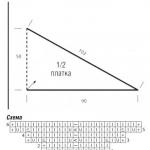The legislation of the Russian Federation provides for cases in which the interests of the applicant can be represented by an authorized person.
Submitting documents to a government organization, defending interests, receiving pension benefits - all these procedures can be carried out by relatives or close people. To obtain the right to representation, a citizen must issue a power of attorney on behalf of the applicant.
Requirements for the principal
A principal is a person who transfers the right to prepare documents and receive compensation benefits, money transfers, cash on delivery and parcels to his representative (trustee).
At the legislative level, the principal must meet a number of requirements:
- be in a capable state at the time of signing the contract;
- have good reasons for transferring the right to receive a pension to a third party (illness, surgery, injury, long-term departure);
- sign a power of attorney voluntarily.
A relative of the pensioner, an acquaintance, an employee of social care, or other services can act as a proxy. The main criterion when choosing an intermediary is the candidate’s credibility.
Dear readers! The article talks about typical ways to resolve legal issues, but each case is individual. If you want to know how solve exactly your problem- contact a consultant:
APPLICATIONS AND CALLS ARE ACCEPTED 24/7 and 7 days a week.
It's fast and FOR FREE!
Sample filling:
The power of attorney contains personal data of the principal and representative and consists of several sections:- “Name” - this section indicates the name of the document “Power of Attorney”;
- “Date” is necessary for the document to come into force (the current date is entered);
- personal and passport data of the principal;
- personal and passport details of the representative;
- written consent to receive funds through a third party;
- validity period of the document (or unlimited option);
- address and date of registration;
- signature of the principal;
- notarial signature or doctor's signature.
Depending on which official representative (notary, chief physician) will sign the document, the forms may vary.
The legal and medical seal on the power of attorney will be evidence of its authenticity. Let us consider in more detail in which cases confirmation from the hospital is required, and in which – notarial confirmation.
How to issue a power of attorney to receive a pension for a bedridden patient
A notarized power of attorney differs from a hospital power of attorney in the duration of its validity. The first is long-term, the second is one-time. The maximum period for which you can issue a power of attorney is 3 calendar years.
Notarized
To draw up a power of attorney, a notary is called to the house of a bedridden pensioner. The call and services of a specialist are paid.
Upon arrival, he must conduct a consultation conversation with the client, explain to him the rights and obligations of the parties, make sure of the pensioner’s legal capacity and begin filling out the power of attorney.
The paper can be designed in any form by hand or typed on a computer. If the principal cannot independently sign the document, this can be done by one of his representatives with his verbal consent.
The power of attorney itself indicates the reason why the applicant did not personally sign.
In cases where a pensioner cannot move, speak, write, or is incapacitated, relatives obtain guardianship over him.
The guardian has the right to represent the interests of the elderly person and sign a number of official documents on his behalf.
In the hospital
For hospitalized pensioners, there are several ways to issue a power of attorney:
- notarized:
- through a representative of the medical institution.
The second case is relevant for concluding one-time transactions under a power of attorney, since it is valid for no more than a month from the date of signing. The document is stamped and signed by the hospital management.
In both the first and second cases, the main form of the power of attorney is accompanied by documentation confirming that the applicant is in temporary hospital treatment, indicating the exact address of the institution and the length of stay there.
Validity
Until recently, a power of attorney could be issued both urgently and indefinitely. At the moment, documents without an expiration date are considered invalid. The document must indicate the date of its execution and the period of its validity.
In cases where only the date of preparation is indicated, the power of attorney is considered valid for 1 calendar year. After the expiration of the established period, the authorized representative must draw up a new document confirming his right to receive the applicant’s pension.
If the principal decides to revoke the document before the agreed time has expired, he notifies the representative.
If the third party refuses to return the authority, the case takes a judicial turn. The rights and obligations of the parties are regulated at the legislative level by the Civil Code of the Russian Federation (Article 186).
Payment procedure
The procedure for receiving a pension by proxy is regulated in Federal Law No. 173 (Article 18). The representative receives his pension at the specified time in the most convenient way for him:
- to a bank card;
- at the post office;
- at a bank branch;
- at the territorial branch of the Pension Fund.
Each time a citizen contacts these organizations, he provides an employee of the institution with a power of attorney and an identity card. You can receive a pension without documentary permission through an ATM. To do this, the representative needs to know the pensioner’s card details.
In the case of issuing a notarized power of attorney to receive benefits for a period of 3 years, the principal must annually confirm his consent to receive payments through 3 persons.
To do this, the pensioner applies for a pension in person once a year, or pays a visit to the Pension Fund. This procedure is necessary to confirm the registration of the principal at the place of residence.
Documents confirming registration may be:
- ID card indicating registration;
- certificate from housing and maintenance organization (housing maintenance organization);
- certificate of residence.
Otherwise, the power of attorney will be revoked. Other reasons why a document is considered invalid are:
- expiration of the established period of validity;
- revocation of powers by the principal;
- refusal of the trustee from the assigned obligations;
- death of the principal, or recognition of him as missing or incompetent.
Registration of a power of attorney to receive a pension for an infirm pensioner is a paid service.
A document granting the right to continued representation is certified by a notary and is valid for a year from the date of preparation.
It is important to know how to receive a pension for a patient at home or in a hospital so that the regularity and timeliness of receiving funds is not disrupted. After all, their need increases due to the cost of treatment.
Methods for delivering pensions to your home
To change the method of delivery of cash payments, an indication of the most optimal option for receiving a pension will be required.
The Russian Pension Fund offers the procedure for delivery and payment of pensions in three ways:
- (at the place of residence);
The easiest way to receive a pension for a bedridden patient is if the funds are transferred to a card. It is enough to hand over the card and provide the PIN code so that a relative or other trusted person can withdraw cash from an ATM and give it to the pensioner.
note: sometimes malfunctions occur in the terminals and the ATM can “chew” or “swallow” the card, write off funds, but not issue banknotes. For proceedings with the bank branch and return of the card, you will need the personal presence of the card owner or a well-executed power of attorney for the person replacing him.
Receipt of pension payments by a trustee
If a pensioner physically cannot receive money, then the only way out is to entrust it to a person in whose integrity he is confident.
In order for an outsider to receive the next payment for a pensioner, a number of actions must be taken.
For those who receive a pension at the post office or at home, a trusted person can do this. This person can be either a relative or a stranger. To grant the principal the right to receive a pension, a document is needed, this is an certifying document (power of attorney).
Power of attorney to receive a pension
Sometimes it is known in advance that the pensioner will be absent at the time of receiving the next payment. A planned operation or examination in a hospital, a trip to a sanatorium-resort treatment is a reason to register a power of attorney with a notary. Such a document will allow you to receive funds in a timely manner, even if the person is in the hospital.
To issue a power of attorney, a pensioner must:
- come to the notary's office in person (you can call a notary to your home for bedridden patients);
- The notary is obliged to make sure that the pensioner is not subject to psychological or other pressure. To do this, he may ask the accompanying persons (and the authorized representative) to leave the premises for a personal conversation with the pensioner.
To issue a power of attorney, you will need a passport identifying the pensioner and the details of the authorized person.
The document contains information:
- title - the word “power of attorney” for an unambiguous legal interpretation of the document;
- passport details of the principal and authorized representative (full name, date of birth, registration address);
- the essence of the entrusted action is receiving a pension;
- validity period of the document - in the absence of this clause, the power of attorney is valid for 1 year from the date of execution;
- place and time of drawing up the document;
- personal signature of the principal;
- notary's mark, signature and seal.
Important: You can sign instead of the principal only in his presence.
If the pensioner cannot sign, but is of sound mind and clearly expresses his will, then another person can sign instead of the principal. At the same time, this circumstance is noted in the document with an explanation of the reason. For example, a pensioner is paralyzed and has a broken arm.
How to save money on issuing a power of attorney for a pensioner
Executing a power of attorney from a notary is a paid service, and going to the client’s home will cost even more.
You can save on notary services if a pensioner is already undergoing inpatient treatment in a hospital. In this case, the power of attorney is drawn up according to the sample, and the function of a notary is performed by the attending doctor and the head physician of the institution. The document must have the clinic's seal.
Note: The organizations where the pensioner works or studies have the right to certify a power of attorney.
Receiving a pension for an incapacitated person
Sometimes it is not possible to obtain the pensioner's informed consent due to their condition. Senile dementia can make it difficult not only to manage money well, but also to take care of yourself.
To receive a pension for an incapacitated relative, you will have to go through the guardianship procedure.
Temporary guardianship can be issued in order to receive a pension for a bedridden patient (paralyzed, in a coma).
The procedure will take time and step-by-step steps:
- registration of disability in a medical institution;
- filing an application to the court to declare a ward or relative incompetent;
- with evidence of the need for guardianship (court decision), they contact the local guardianship and trusteeship authorities.
After establishing guardianship, the guardian has all the rights to exercise the rights of the ward, including receiving a pension for an incapacitated parent or other relative.
On a note: if an incapacitated relative is in a specialized institution (nursing home), then this organization is his guardian; it receives and manages pension payments.
If you didn't receive your pension on time
Registration of guardianship may take 2–3 months or more. It is clear that the sick pensioner did not receive monthly payments during these periods. Therefore, the guardian often has a question about whether they did not receive it at home on time.
The question is also relevant in a situation where a pensioner was in the hospital and missed the date of receiving a monthly payment, but the money is needed now. There is no problem for bank card holders - funds are transferred on the appointed date and can be withdrawn at any time. For those who receive their pension by mail or have it delivered to their home, there is also a way out.
If you have not received your pension on time at home, you need to contact the central post office before the end of the billing period. It usually lasts until the 22nd–25th of each month.
What to do if you haven’t received your pension on time: necessary actions
If, as a result of the appeal, you learned that the statement was closed and the money was returned to the Pension Fund account, then next month the pensioner will receive a pension for both billing periods. It is possible to speed up payment for the missed month by writing an application to receive funds at the beginning of the month.
If he has not been home for several months, on the next billing date he will receive the amount for all missed billing periods. If a pensioner has not received a pension for more than 6 months, payment is suspended. To renew, you will have to contact the Pension Fund at the place of registration.
Therefore, if you plan to leave for a long time, it is better to take care of regularly receiving your pension:
- by power of attorney to a relative or friend who will keep the money or send it to the pensioner;
- temporary change in the method of delivery of pension payments - to a bank card.
- You can arrange delivery of your pension by transfer to a bank card in your personal account on the Pension Fund website.
Attention: If there has been no movement on the client’s account for a year, payments are suspended.
They can be renewed only after confirming your registration at the territorial office of the Pension Fund.
Thus, in order not to complicate his life with additional hassle and questions about where to receive a pension if he has not received a pension at home, it is better for the pensioner to implement in advance one of the ways to receive payments on time.
The question of how to issue a power of attorney to receive a pension if a person is in hospital (as a bedridden patient) arises almost every day. But first of all, let’s understand the rules for transferring funds. When applying for a pension, a citizen must necessarily discuss with the Pension Fund the question of where the funds will be transferred, or how he will receive them.
Pensioners are offered several options from which they can choose the most convenient:
- Transfer to a bank card.
- Transfer to a bank account.
- Receipt in cash at the post office.
- Delivery of pension to your home.
The most acceptable and convenient options are those associated with non-cash transfer of money to the card of the selected bank.
Younger pensioners prefer this method of pension delivery. But those recipients who are accustomed to receiving money the old-fashioned way prefer to still hold cash bills in their hands.

There are days when some sick pensioners are missing from the queue. Who will receive a pension for them, because this money is needed for mandatory expenses: paying for housing and utilities, buying food and medicine.
There is an exit: every pensioner should take care to provide for some life situations, in particular, illnesses when you have to go to the hospital to improve your health. To do this, it is necessary to issue a power of attorney for a loved one, a relative, so that he can receive cash benefits in place of the sick person in due time.

Sample power of attorney.
A power of attorney is an official legal document on the basis of which a citizen can receive money for a principal, in this case, for a pensioner. It is certified by a notary, since we are talking about money and is drawn up on an official form, which must include:
- Document title.
- Date of issue.
- Full name of the principal and the authorized representative.
- Date and place of birth of both citizens.
- Passport details of the pensioner and the authorized representative in full.
- Information about the place of residence and registration of the principal and authorized representative.
- A mention of exactly what funds are entrusted to be received for the pensioner.
- Powers of a trustee.
- Duration of the power of attorney.
- Pensioner's signature.

Sample certificate of registration (stay).
There are other ways to formalize a power of attorney:
- At the place of study or work– the witness is the head of the enterprise or educational institution.
- In a medical facility– the document is certified by the chief physician if the principal is undergoing treatment in a hospital.
Few pensioners know that 01.09.13. An amendment was made to the Civil Code of the Russian Federation stating that certification of documents is free for educational and medical institutions.
Therefore, it is recommended to issue a power of attorney not at a notary’s office, but directly on behalf of the medical institution. With a power of attorney executed according to the rules, the recipient can safely come to the post office and receive a pension on the basis of this document in order to transfer it to the pensioner.
About the validity period of the power of attorney
 In accordance with the Civil Code of the Russian Federation, the validity period of such documents must be specified in the power of attorney itself and determined by the principal. In the old version of the law, the maximum period of its validity was limited to 3 years.
In accordance with the Civil Code of the Russian Federation, the validity period of such documents must be specified in the power of attorney itself and determined by the principal. In the old version of the law, the maximum period of its validity was limited to 3 years.
The amended article in the law does not limit the period; it must be indicated by the principal himself. If the period is not mentioned, the document will be valid for 1 year.
Other conditions stipulated by law, according to which its validity may expire:
- Expiration of the validity period specified in the document.
- Refusal of the principal from the services of a third party.
- Refusal of the recipient to provide services to the pensioner.
- Loss of legal capacity of one of the citizens specified in the power of attorney.
If the pension is delivered by an employee of the post office directly to the pensioner’s home, then the power of attorney will also be valid.
Thus, if life circumstances arise in which the pensioner himself is physically unable to receive pension funds, issuing a power of attorney for a legally capable person is the most acceptable option for receiving and transferring money to him.
 A pensioner who needs a trusted person who will receive a pension for him must write a power of attorney in his own hand, unless we are talking about a notary office, and the following requirements are imposed on him:
A pensioner who needs a trusted person who will receive a pension for him must write a power of attorney in his own hand, unless we are talking about a notary office, and the following requirements are imposed on him:
- He must be competent, of sound mind and memory.
- Signing of the document must be voluntary.
A witness must be present when writing a power of attorney. His role is to sign the document and comply with the terms of its preparation. Certification is carried out according to the standard in the sequence one entry after another:
- Signature.
- "Right"
- Position of witness.
- Personal signature.
- Full name.
- Certification date.
- Seal of the institution.
If a pensioner is being treated in a hospital, the chief doctor signs a power of attorney and affixes the hospital’s seal, or a notary is invited to the room.
A citizen has the right to apply to the Pension Fund for a pension before caring for an incapacitated person, as well as at any time during the period of care. The following methods of submitting documents are possible:
- personally;
- Russian Post (letter with notification and list of attachments);
- through a representative;
- in the form of an electronic application on the website of the Pension Fund or State Services (via the “Personal Account” after preliminary registration).
The deadline for applying for payment is determined based on the date specified in the application. Step-2. Processing of documents in the Pension Fund of Russia. After receiving documents from the applicant, Pension Fund employees process the papers within 10 working days. After another 5 days (15 days from the date of application), the Pension Fund is obliged to send the guardian a notice of the assignment of a pension or refusal of it.
Receive a pension for a sick person lying at home
The only difference is the indication that the certifying person is the head physician of the medical institution. In addition to the signature of the head physician, the power of attorney must be affixed with the hospital’s seal. Both of these methods are applicable in cases where a pensioner who is in a hospital has not lost his legal capacity.
That is, he is able to personally sign a power of attorney or prove his ability to perform legally significant actions in another way. If the pensioner is not capable of this, then the only way to get a pension for him is to register guardianship.
- Guardianship of a pensioner.
This procedure is more complex and is carried out by the guardianship and trusteeship authorities. The basis for it is a medical report on the pensioner’s inability to take independent legal action (incapacity).
How to receive a pension for an incapacitated relative
If the pensioner cannot sign, but is of sound mind and clearly expresses his will, then another person can sign instead of the principal. At the same time, this circumstance is noted in the document with an explanation of the reason. For example, a pensioner is paralyzed and has a broken arm.
Attention
How to save money on issuing a power of attorney for a pensioner Executing a power of attorney from a notary is a paid service, and going to the client’s home will cost even more. You can save on notary services if a pensioner is already undergoing inpatient treatment in a hospital. In this case, the power of attorney is drawn up according to the sample, and the function of a notary is performed by the attending doctor and the head physician of the institution.
The document must have the clinic's seal. Please note: the organizations where the pensioner works or studies have the right to certify a power of attorney.
Receiving a pension for a sick person in hospital
If there are circumstances worthy of attention, a guardian or trustee may be appointed by the guardianship and trusteeship authority at the place of residence of the guardian or trustee. The basis for the emergence of relations between a guardian or trustee and a ward is the act of the guardianship and trusteeship authority on the appointment of a guardian or trustee. The act of the guardianship and trusteeship authority on the appointment of a guardian or trustee may indicate the duration of the powers of the guardian or trustee, determined by the period or indication of the occurrence of a certain event. You need to contact the guardianship authority at the place of residence of the father. You will need your birth certificate as proof of relationship.
- Thanks for the answer.
- Hello! My friend is going to take care of her elderly grandfather and move him into her apartment, while renting out his apartment.
Pension of an incapacitated person
It is from this number that the validity period of the document is calculated, unless otherwise indicated. An undated document will not have legal force. Registration procedure How to do and where to certify? Depending on the circumstances, a power of attorney can be issued and certified in different ways:
- from the head physician if the patient is in the hospital;
- there is a fee for visiting a notary;
- at the place of work or study free of charge;
- with calling a notary to your home at a double rate if the patient is unable to move.
The easiest way, of course, is to draw up the paperwork from a notary: you won’t need to draw up anything yourself; their offices have ready-made templates for different life circumstances.
We will provide examples of such templates; you will have the opportunity to download a power of attorney form that has been proven in practice.
Pensions in 2018
Can the Pension Fund refuse to pay a pension? Step-3. Payment purposes. In general, the monthly payment to the guardian of an incapacitated person is assigned in the month of applying for a pension. At the same time, a citizen cannot receive payment before such a right arises, that is, until the start of care for an incapacitated person.
In accordance with the established procedure, pensions to guardians of incapacitated persons can be paid in one of the following ways:
- via Russian Post (home delivery or collection at the post office);
- through a bank (non-cash transfer of funds to a card or receiving cash at the bank’s cash desk);
- through a special organization (delivery to your home by courier or collection at the organization’s cash desk).
Please note that when making payments through Russian Post, funds are issued in accordance with the schedule approved at the post office.
On receiving pensions for incapacitated citizens
The pension is credited to a bank card. Recently, transferring pension payments to a bank card or personal bank account has become increasingly popular. In this case, there are no problems with receiving a pension. Any person who is entrusted by a pensioner in the hospital with the bank card itself and its PIN code will be able to freely withdraw funds.
No additional documents are required. The only thing that is necessary is a trusting relationship between the pensioner and the person withdrawing funds from the card or bank account. The pension is received by mail or delivered to the pensioner’s home. In this case, receiving a payment for a pensioner who is in the hospital is no longer so easy. Without a properly executed power of attorney, a pension will not be issued to another person.
Menu
Subject to certain conditions, citizens caring for disabled people can receive a monthly payment in the form of a pension. In this article we will look at how pensions are calculated for guardians of incapacitated persons, how to process the payment and what documents are required for this. Pension for guardians of incapacitated persons: conditions for assignment Pension for guardians of incapacitated persons: amount, how to apply Based on current legislative norms, a citizen may be assigned a pension for the care of an incapacitated person subject to the following conditions:
- An incapacitated citizen is a disabled person of group I or an elderly person.
How can you get a pension for a sick person lying at home?
- Categories
- Civil law My mother lies in a coma after craniotomy, how can I get a pension for her, the operation was an emergency, she is 82 years old, the pension fund refused to help me, I do not have a power of attorney from my mother, everything happened suddenly. We need money for a nurse and food. recognition as incompetent, power of attorney for a pension fund, guardianship over an incapacitated adult, guardianship over the elderly, recognition of an elderly person as incompetent, power of attorney to receive a salary, power of attorney to receive a pension, recognition of a person as incompetent, power of attorney for a pension Collapse Lawyers' answers (14)
- All legal services in Moscow Help in refinancing a loan Moscow from 5,000 rubles. Reducing cash payments on a Moscow loan from 20,000 rubles.
Note: if an incapacitated relative is in a specialized institution (nursing home), then this organization is his guardian; it receives and manages pension payments. If the pension is not received on time Registration of guardianship may take 2–3 months or more. It is clear that the sick pensioner did not receive monthly payments during these periods.
Therefore, a guardian often has a question about where to receive a pension if they did not receive it at home on time. The question is also relevant in a situation where a pensioner was in the hospital and missed the date of receiving a monthly payment, but the money is needed now. There is no problem for bank card holders - funds are transferred on the appointed date and can be withdrawn at any time.
For those who receive their pension by mail or have it delivered to their home, there is also a way out.





